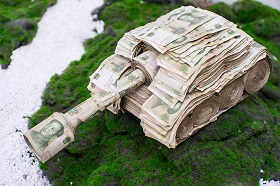China's Foreign Policy under Xi Jinping: What’s Anticipated for the US and Russia
(no votes) |
(0 votes) |
Senior research fellow at MGIMO Institute for International Studies, Center for Euroasian Studies, RIAC Expert
In February 2016, the American Council on Foreign Relations published a report “Xi Jinping on the Global Stage: Chinese Foreign Policy under a Powerful but Exposed Leader,” prepared by Robert D. Blackwill and Kurt M. Campbell. The report is a kind of “policy brief” prepared specifically for the new president, regardless of his or her party.
In February 2016, the American Council on Foreign Relations published a report “Xi Jinping on the Global Stage: Chinese Foreign Policy under a Powerful but Exposed Leader,” prepared by Robert D. Blackwill and Kurt M. Campbell [1]. The authors gave themselves the task of analyzing Beijing’s actions on the world stage under the current President of the People’s Republic of China, whom they call “the most powerful Chinese leader since Deng Xiaoping.” [2]
The report was written by influential experts with extensive experience as lead advisors on US policy in the Asia Pacific region under the last two presidents of the United States. The authors’ conclusions are of great interest: Robert Dean Blackwill, former US ambassador to India, was part of a group of foreign policy experts who advised George W. Bush, while Democrat Kurt Michael Campbell served as the US Assistant Secretary of State for East Asian and Pacific Affairs under Barack Obama.
The report is a kind of “policy brief” prepared specifically for the new president, regardless of his or her party. However, there are no particular differences between Republican Blackwill and Democrat Campbell on Washington’s policy towards China. Both experts believe that China represents and will remain the most significant geo-strategic competitor to the United States, and that tensions between the great powers will always exist [3].
Authors regard the visit of the Chinese leader to the United States.
The authors regard the visit of the Chinese leader to the United States in September 2015 as a high-stakes affair. It came at a time of “deepening distrust” [4] between the two countries, and President Xi Jinping proved himself to be a charismatic politician and demonstrated an ability to react nimbly and effectively to his competitor’s initiatives. Paraphrasing the authors of the report, we can say that the personality of Xi Jinping is a definite bonus to the strength of China’s foreign policy. It’s a challenge that the new US president will face in dealing with him in the future.
The fact that chauvinistic sentiments in China are tending to rise, and the determination with which Xi Jinping and Wang Qishan (head of the anti-corruption department of the Communist Party) are imposing order in the ranks of the elite and bureaucracy, cannot but scare the American establishment. The US administration would rather work with a “technocratic cabinet,” which is interested in declarative forms of grandeur, but lacks ambitions to change the “rules of the game,” as the case during the period of the Hu Jintao-Wen Jiabao tandem. The report focuses exactly on the changes in China’s foreign policy under Xi Jinping, and the challenge they represent to the ambitions of the United States.
The authors argue that the actions of Xi Jinping result not from his self-gratification, but derive from the conditions that modern China is facing today. This explains why R. Blackwill and K. Campbell consider President Xi Jinping to be a “powerful, but exposed” (or, in other words, “dependent”) leader. The experts stem from the assumption that China’s foreign policy in the coming years will be largely shaped by a slowdown in the country’s economic growth.
For nearly three decades, China’s annual GDP rose by more than 10 percent, while now, according to some conservative estimates, it has dropped to just 5 percent [5]. Given the lack of the former economic success that, according to authors of the report, somehow substantiated the legitimacy of the CPC’s staying in power, Xi Jinping will have to place a stake on new mechanisms to ensure the loyalty of the population. They come to conclusion that Beijing has made a choice in favor of nationalism and even building Xi’s cult of personality [6]. All this is happening against the background of an intensified anti-corruption campaign to restore public confidence in the authorities, and to clean up the political elite of any opposition.
R. Blackwill and K. Campbell consider President Xi Jinping to be a “powerful, but exposed” (or, in other words, “dependent”) leader.
To encourage the growth of nationalist sentiments and create conditions for demonstrating the leader’s “power,” Xi Jinping will need “small victorious wars.” The US experts expect Beijing to embark on the path of escalating territorial disputes on the border with India and in the South China and East China Seas, as well as to take a tougher stance in dealing with Washington. Incidentally, the authors believe that Xi Jinping is taking a cue from Vladimir Putin, who uses similar mechanisms to improve his rating in Russia [7].
To create conditions for demonstrating the leader’s “power,” Xi Jinping will need “small victorious wars.”
The experts express particular concerns over Beijing’s desire to establish and lead foreign policy alliances without Washington’s participation, as well as over military modernization and bold statements, including those about US allies in the region (for example, Foreign Ministry spokeswoman Hua Chunying “demurred when asked whether Okinawa was part of Japan” [8] ).

Artyom Lukin, Andrey Gubin:
China 100 Years Down the Line: Before and After
the War of Asia
Perceiving these tendencies as a threat to the interests of the United States, the authors of the report urge Washington to develop a new grand strategy in the region to ensure US domination in the rivalry with China. The proposed mechanisms include the Trans-Pacific Partnership (TPP), lifting constraints on US exports of oil and gas to its Asian allies, as well as deploying at least 60 percent of the US Navy and Air Force to the region [9].
Notes in the margin
The competence of the authors in understanding the processes that are underway in China is beyond any doubt. However, some of their conclusions seem to be quite controversial. For example, it seems less than likely that Beijing, following the election of Democratic Progressive Party (DPP) candidate Tsai Ing-wen, will react strongly and decisively to any Taiwanese policy under the DPP designed to increase separation between Beijing and Taipei [10]. In addition, several other arguments of the report invite questions.
The proposed mechanisms include the Trans-Pacific Partnership (TPP), lifting constraints on US exports of oil and gas to its Asian allies, as well as deploying at least 60 percent of the US Navy and Air Force to the region.
First, the conclusions drawn from the slowdown in GDP growth appear to be rather hasty. One gets the impression that the world has been fascinated by China’s economic miracle for so long that it hastened to move past this boom at the first signs of the country’s economic faltering. However, despite the slowdown, China’s economy is still growing quite rapidly, compared to the US GDP growth of just over 2 percent, Japan’s – a little more than 1 percent and Russia’s decrease by 3.9 percent in 2015 [11].
It is often argued that a slowdown in China’s GDP growth to a certain point (e.g. 5 percent [12] ) will trigger an irreversible crisis, which will result in social upheaval and the collapse of the regime. Social tensions in China do exist and often lead to spontaneous riots. The main reasons for this are environmental degradation and land frauds by private owners and corrupt officials. Since the state during such riots usually takes sides with “the public at large,” these incidents would sooner strengthen the regime than weaken it.

Xi Jinping is undermining the compromise with the elite that allows the leader to retire quietly and fear no criminal prosecution.
Xi Jinping follows the “good Tsar and the bad Boyars [aristocrats]” strategy and, judging by the tone of Chinese microblog accounts, not without avail. The continued decline of the “maximum allowable percentage of GDP growth” notwithstanding, the Communist Party is still in power, and its monopoly strengthens due to Xi’s efforts. In this regard, it seems relevant to cite Russia as an example of a country whose political stability has not been affected by a severe recession. Why would the propaganda and mobilization mechanisms that proved to be quite effective in shaping the Russian society, be less effective in China, with the latter’s centuries-old tradition of “a weak society in a strong state”?
In addition, the authors tend to overestimate “the role of personality in history.” In terms of reinforcing his personal position as a strong national leader, Xi Jinping has left behind even Deng Xiaoping, who is mentioned by the American experts. Throughout the 1980s, Deng Xiaoping strived to build a collective leadership system and vigorously opposed arrangements oriented on a single charismatic leader. In this respect, it seems more appropriate to draw an analogy between Xi Jinping and Chairman Mao. Furthermore, apart from physical resemblance and their first ladies’ occupation, Xi Jinping and Mao Zedong have another thing in common which is much more important. By using the anti-corruption campaign to clean up the political environment, Xi Jinping is undermining the compromise with the elite that allows the leader to retire quietly and fear no criminal prosecution. Thus, for the first time since the early 1990s, the tried and true mechanism of the leader’s alternation of generations may break, and Xi Jinping will be forced to join the ranks of lifelong rulers, which is commonplace in Eurasia.
It’s difficult to believe that the personal qualities of Xi Jinping will exert a decisive influence on shaping Beijing’s international strategy. All the radicalism of Mao Zedong notwithstanding, China’s foreign policy during his time displayed caution and pragmatism: when dealing with hostile Soviet Union, the country got by with “Chinese warnings,” as well as established rapprochement with the capitalist United States in the midst of the Cold War. It seems that the “greater freedom of expression,” [13] which Beijing takes liberties in telling, is a calculated strategy that has nothing to do with emotions or psychological complexes. Xi Jinping will not eat the seed corn by falling out with China’s major trading partners either for nationalistic reasons, or certain alliance commitments.
Finally, the very idea of confrontation between the US and China seems somewhat theoretical. Of course, this is a very creative and popular idea among experts, as it allows them to write numerous analytical reports, take part in conferences and receive research grants. Anti-American rhetoric in China and anti-Chinese rhetoric in the US are very effective mechanisms to manipulate public opinion. Donald Trump’s campaign, in which the word “China” appears to be one of the most widely used [14], illustrates this perfectly well.
The “greater freedom of expression,” which Beijing takes liberties in telling, is a calculated strategy that has nothing to do with emotions or psychological complexes.
In practice, we are witnessing the complementarity between the two countries, rather than their confrontation, which is confirmed by the share of each in the trade turnover of the other. In 2015, turnover between China and the United States amounted to 600 billion dollars [15] (six times more than that between “strategic partners” Russia and China, and three times more than that between the US and Japan, its closest ally in the Asia-Pacific region [16] ).
Along with Canada and Australia, the United States happens to be the most attractive country for the migration of the Chinese elite and the export of capital. Xi Jinping’s daughter studied at Harvard [17]; every fourth foreign student in the US is Chinese [18]. Zbigniew Brzezinski’s thesis of long standing that it has yet to be found out, “whose elite it is: yours or ours,” is just as true for China. For now, America is closer and more comprehensible to the Chinese elite than any other “great power” in the world.
Leads for Russia
In other words, many provisions of the report look somewhat prejudiced and, apparently, are intended to vividly describe the risks and threats for the new US administration, which, of course, can be minimized, if the recommendations of the acknowledged experts are followed. However, an expert opinion per se, even divorced from reality, may be a factor of exerting influence on managerial decisions.
The report allows for a prediction of what kind of considerations will shape Washington’s policy towards China and what the US-China relationship will look like in the coming years. It seems that it will imply a quite aggressive, nationalist-tinged rhetoric (especially in the event of coming to power of a populist candidate), combined with a pragmatic course in trade and investment cooperation.
The degree of confrontation between the US and China should not be overestimated. Our country should not make the mistake of pinning too many hopes on a strengthened friendship with China due to a mutual dislike of the West. Aggressive foreign policy rhetoric can coexist perfectly well with high rates of turnover and humanitarian exchange that can unite the countries more strongly than any political declaration.
1. Blackwill R. , Campbell K. Xi Jinping on the Global Stage: Chinese Foreign Policy Under a Powerful but Exposed Leader. Available for download at http://www.cfr.org/china/xi-jinping-global-stage/p37569
2. Ibid, p. vii
3. Blackwill R., Tellis A. Revising US Grand Strategy Toward China. URL: http://carnegieendowment.org/files/Tellis_Blackwill.pdf The US and China: Will the Rift Be Eternal? URL: http://www.golos-ameriki.ru/content/us-china/1622371.html [in Russian]
4. Blackwill R., Campbell K. Op.cit. p. 21
5. Ibid, p. 4
6. Ibid, p. 7
7. Ibid, p. 24
8. Ibid, p. 18
9. Ibid, p. 30
10. Ibid, p. 25
11. Results of 2015: the economy is walking on an uneven floor. URL: http://www.interfax.ru/business/488014 [in Russian]
12. China's Economy: a Bubble about to Burst. URL: : http://ktovkurse.com/redaction/ekonomika-kitaya-puzyr-kotoryj-vot-vot-lopnet [in Russian]
13. Yan Xuetong: China should allow more freedom of expression. URL: http://mp.weixin.qq.com/s?__biz=MzA3MzY3NjEzNA%3D%3D&mid=401735925&
idx=1&sn=0839dfca3273fb0c9dc6bf41280b2553&scene=2&srcid=0316H9FTsNUDB
92GiEuaGGxT&from=timeline&isappinstalled=0#wechat_redirect14. Donald Trump Says ‘China’. URL: https://www.youtube.com/watch?v=RDrfE9I8_hs
15. US Census Bureau: Trade in Goods with China. URL: https://www.census.gov/foreign-trade/balance/c5700.html
16. US Census Bureau: Trade in Goods with Japan. URL: https://www.census.gov/foreign-trade/balance/c5880.html
17. Osnos E. What Did China’s First Daughter Find in America. URL: http://www.newyorker.com/news/news-desk/what-did-chinas-first-daughter-find-in-america
18. Belyavina R. US Students in China. URL: http://www.iie.org/Research-and-Publications/Publications-and-Reports/IIE-Bookstore/US-Students-in-China
(no votes) |
(0 votes) |







